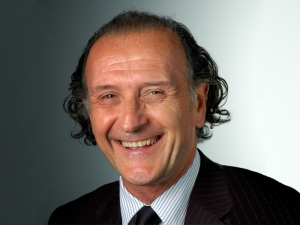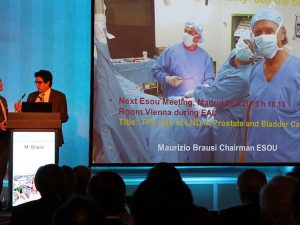Strengthening the onco-urology global community is one of the core aims of the upcoming 16th Meeting of the EAU Section of Oncological Urology (ESOU19). The meeting will provide all participants the opportunity to enrich what they know, and to connect with colleagues with diverse expertise. ESOU19 encourages the exchange of ideas and strategies to boost innovations in clinical practice and patient care.
We interviewed ESOU19 Meeting Chairman, Prof. Marek Babjuk (CZ) of the Charles University in Praha Motol University Hospital for his insights regarding the meeting’s objectives.

What are the new developments that will be examined and discussed during the meeting?
ESOU19’s Scientific Programme will cover the whole spectrum of contemporary diagnosis and treatments for onco-urological diseases. We will concentrate on new surgical techniques, imaging methods and their implementation in daily practice.
What are topics and activities that participants can look forward to at ESOU19?
Participants will receive comprehensive, relevant updates from top experts in onco-urology, as the ESOU strongly supports cooperation among experts of varied specialties. True to its goal of pursuing multidisciplinary collaboration, ESOU19 is where medical oncologists, radiation oncologists, pathologists, radiologists and other specialists will convene and share their expertise.
The meeting will also examine the benefits of multi-parametric magnetic resonance imaging (mpMRI) in the diagnosis of prostate cancer (PCa), and evaluate the new drugs in the treatment of muscle-invasive bladder cancer (MIBC) and renal cancer. We will explore the role of genetics in PCa, share updates on checkpoint inhibitors, and discuss new bladder-sparing approaches in MIBC.
To further involve and support young urologists, the STEPS (Sessions To Evaluate ProgresS in the management of urological cancers) programme will be the conducive platform for selected young urologists to discuss cases with established international experts.
Participants shouldn’t miss the “Treatment of localised and locally advanced prostate cancer” course organised by the European School of Urology (ESU) wherein management of recurrent disease will be reviewed, and the ability of new developments in multimodal treatment to improve cancer control will be critically assessed. The course will provide practical tips and tricks, taking into account the most recent developments in the field.
In your expert opinion, what are the current major challenges in the field of onco-urology?
The desired goal is the improvement of oncological results in parallel with the decrease of treatment morbidity. We must concentrate not only extending a patient’s life but the quality of that life.
Then there’s also the factor of costs. There are economic challenges connected with the increasing cost of new treatments. The implementation of said treatments in reimbursement systems will be of utmost importance.
What are the breakthroughs that you expect in the coming decade?
I foresee new drugs in diverse therapies such as in immunotherapy, gene therapy and more. The indication of modern systemic treatments will be approaching lower stages of diseases. Prediction of prognosis of localized tumours and selection of those with the worse prognosis will be better. On the other hand, I believe that high-quality and less-invasive surgical methods will still play a crucial role in the treatment of most solid tumours.
Although I don’t expect dramatic changes in the approach to onco-urological diseases, we will continue to push forward with more research to build up robust, reliable data; and to explore more and more ways to incorporate technologies (e.g. artificial intelligence) into potential innovations for our clinical practice and patient care.
About the meeting
ESOU19 will take place from 18 to 20 January 2019 in historic Prague, Czech Republic. The meeting’s diverse scientific programme will include debates on prostate, bladder and renal cancers. The multidisciplinary approach to a given cancer will be illustrated and discussed with clinical case presentations, video sessions and point counterpoint discussions. For more information, please feel free to explore the ESOU19 website.



